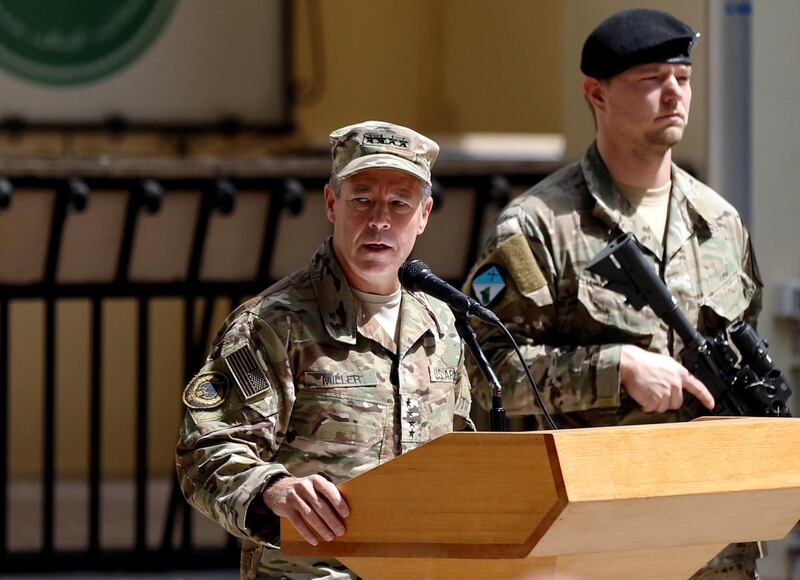US Army General Scott Miller took charge of Nato forces in Afghanistan on Sunday, arriving as Washington faced growing questions over its strategy to force the Taliban into talks.
The former commander of the US military's Joint Special Operations Command takes over at a time of mixed hope and fear for the western-backed government in Kabul.
"To be successful, we must continually learn and adapt to the enemy and the environment," Gen Miller said at a change-of-command ceremony at the headquarters of the Nato-led Resolute Support mission in Kabul.
"There is no room for [the] status quo. We cannot afford to be complacent."
The United States is now a year into its strategy of stepping up pressure on the Taliban by increasing air strikes and sending thousands more troops to train and advise Afghan forces, but clear signs of success have proved elusive.
Civilian casualties are at record levels, there have been repeated attacks on major cities such as Kabul and Jalalabad and although the Taliban have not managed to take any significant urban centres, they control large areas of the countryside.
In June, a Pentagon report offered a downbeat view, claiming there was little publicly available evidence that "actions to increase pressure on the Taliban were having a significant impact".
Afghan forces, meanwhile, are chronically understrength because of heavy casualties and high levels of desertion, and continue to face problems with organisation and logistics. As Gen Miller was assuming command, a helicopter carrying Afghan troops crashed in the northern province of Balkh. Two soldiers and the foreign pilot of the chartered aircraft were killed.
Hopes of a breakthrough in achieving peace talks were raised by an unprecedented ceasefire over the Eid holiday in June but optimism was dampened by the insurgents' assault on the city of Ghazni last month.
"I believe that some of the Taliban want peace also but they are being encouraged to keep fighting," the outgoing commander Gen John Nicholson said at the ceremony. He urged the insurgents to listen to demands for peace from the Afghan people.
"It is time for this war in Afghanistan to end," he added.
_______________
Read more:
[ It's time to talk peace, Nato's Afghan envoy tells Taliban ]
[ ISIS taxi drivers ferrying weapons and fighters arrested in Kabul ]
[ Former Afghan security chief considering bid for presidency ]
_______________
Like Gen Nicholson, Gen Miller spent years in Afghanistan before assuming command of US and coalition forces there. His career followed the different stages of what is now America's longest war.
He was among the first US troops to arrive in 2001 as part of the campaign to topple the Taliban following the September 11 attacks in the United States.
Almost a decade later, he served during the "surge" ordered by then president Barack Obama, which saw more than 100,000 Nato troops in Afghanistan. Gen Nicholson also served in 2013-14 as most international troops were withdrawn.
Washington has accepted that a purely military victory is not possible and has focused on forcing the Taliban to the negotiating table.
The strategy is under scrutiny amid reports President Donald Trump has grown impatient with the lack of clear progress.





